1. Overview
Edward James Olmos is an acclaimed American actor, director, and activist, widely recognized for his profound impact on Latino representation in American media and his unwavering commitment to social justice. His career spans decades, marked by iconic performances across film, television, and theater. He is particularly known for his roles as Lieutenant Martin "Marty" Castillo in Miami Vice, Detective Gaff in Blade Runner and its sequel Blade Runner 2049, and as the inspiring high school math teacher Jaime Escalante in Stand and Deliver, for which he received an Academy Award nomination. Olmos also notably portrayed William Adama in the reimagined Battlestar Galactica and Felipe Reyes in Mayans M.C.. Beyond his artistic achievements, Olmos has dedicated himself to community empowerment, co-founding significant organizations like the Los Angeles Latino International Film Festival and Latino Literacy Now, and serving as a UNICEF Goodwill Ambassador, advocating for human rights, animal welfare, and environmental sustainability.
2. Early life
Edward James Olmos's early life in East Los Angeles laid the foundation for his later career, shaping his identity and commitment to his community.
2.1. Childhood and upbringing
Edward James Olmos was born on February 24, 1947, and raised in East Los Angeles, California. His father, Pedro Olmos, was a Mexican immigrant who moved to California in 1945, working as a welder and mail carrier. His mother, Eleanor (née Huizar), was an American of Mexican descent. His parents divorced when he was seven years old, and he was primarily raised by his great-grandparents while his parents worked. Growing up in a community with diverse ethnic groups and high crime rates, Olmos gained firsthand experience that would later inform his advocacy for education and responsible behavior among at-risk youth.
2.2. Education and early interests
Olmos initially aspired to become a professional baseball player. At the age of 13, he joined the Los Angeles Dodgers' farm system as a catcher. However, at 15, he decided to leave baseball to pursue a career in rock and roll music, a decision that caused a rift with his father. He graduated from Montebello High School in 1964, where he ran for Student Body President but lost to future California Democratic Party Chair Art Torres. During his teenage years, he became the lead singer for a psychedelic rock/hard rock band he named Pacific Ocean, aiming for it to be "the biggest thing on the West Coast". Concurrently, he attended classes at East Los Angeles College, including courses in acting, which would eventually lead him to the performing arts.
3. Career
Edward James Olmos has had an extensive and diverse career spanning music, theater, film, and television, often breaking barriers for Latino artists in Hollywood.
3.1. Music career
In 1967, Olmos, under the name Eddie James, formed the bluesy psychedelic rock band Pacific Ocean, serving as its lead vocalist and keyboardist. The band performed at various clubs in and around Los Angeles. In late 1968, they released their self-titled and only album, Purgatory, through VMC Records. The album was promoted with two singles, "I Can't Stand It"/"I Wanna Testify" and "My Shrink"/"16 Tons", followed by a nationwide tour in early 1969. During a performance, Olmos once slipped on stage, landing on a nail that pierced his knee. Another incident involved him jumping from an organ onto a drum set, resulting in him being knocked unconscious and the drummer's shoulder being dislocated. In 1972, he also contributed backing vocals to the final song on Todd Rundgren's album Something/Anything?.
3.2. Theater
In the late 1960s and early 1970s, Olmos transitioned from music to acting, appearing in numerous small productions. His major breakthrough came when he portrayed the narrator, known as "El Pachuco", in the play Zoot Suit. This play dramatized the Zoot Suit riots, a series of conflicts during World War II in California fueled by tensions between Mexican-Americans and local police. The play's success led to its transfer to Broadway, where Olmos earned a Tony Award nomination for his performance. He later reprised the role in the 1981 filmed version of the play. Olmos has also been a frequent guest narrator at Disney's Candlelight Processional at Walt Disney World, where he narrates the nativity story.
3.3. Film
Edward James Olmos's film career is marked by a wide range of roles, from early supporting parts to critically acclaimed performances that significantly impacted cinematic storytelling and Latino representation.
3.3.1. Early film roles
Olmos's early film appearances included roles in Black Fist (1974), where he was uncredited as a junkie, and Aloha Bobby and Rose (1975) as Chicano #1, credited as Eddie Olmos. He also appeared in Alambrista! (1977) as a drunk. In 1980, he was cast as Captain Lopez in the post-apocalyptic science fiction film Virus (復活の日Fukkatsu no HiJapanese), a Japanese production directed by Kinji Fukasaku. His role required him to play the piano and sing a Spanish ballad. Although not a box office success, Virus was notable for being the most expensive Japanese film made at the time. He also appeared in Wolfen (1981) as Eddie Holt.
3.3.2. Breakthrough roles
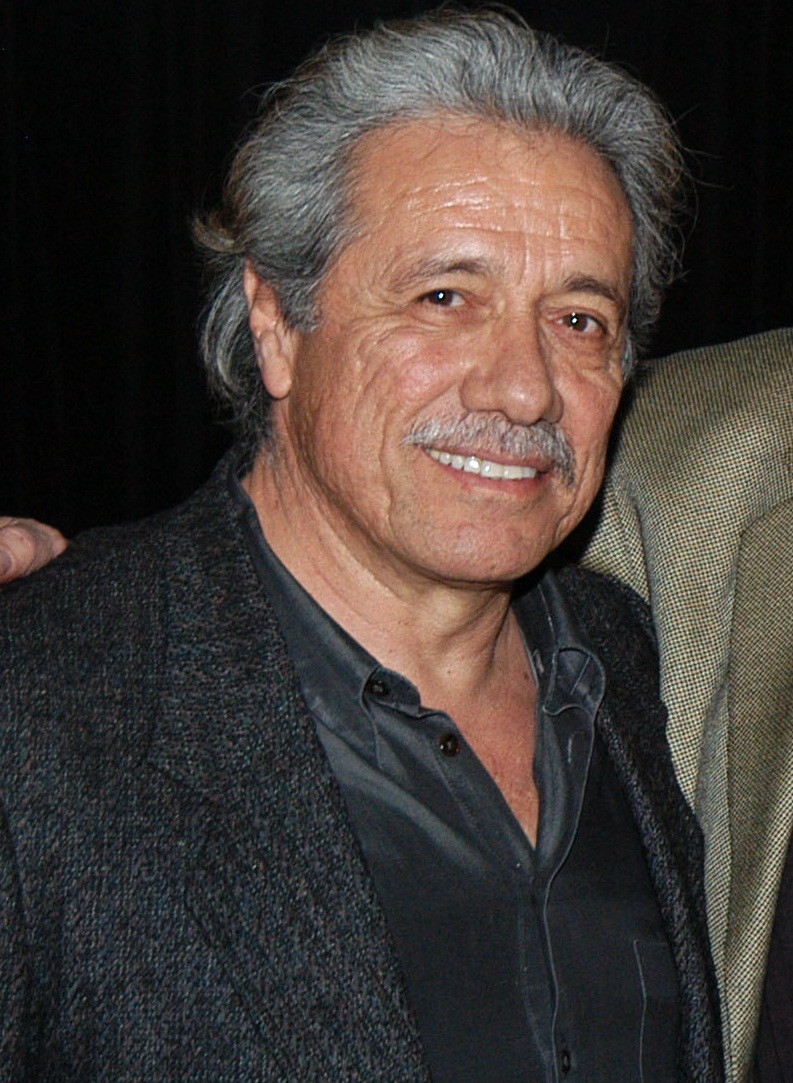
Olmos achieved significant recognition for his role as Detective Gaff in Ridley Scott's 1982 neo-noir science fiction film Blade Runner. His enigmatic portrayal of the character, known for his origami creations and cryptic remarks, left a lasting impression. In 1988, Olmos starred in Stand and Deliver, where he played the real-life high school math teacher Jaime Escalante. His powerful and inspiring performance earned him an Academy Award for Best Actor nomination, making him the first American-born Hispanic actor to receive this honor. This role cemented his presence in Hollywood and highlighted his ability to portray complex and impactful characters.
3.3.3. Major filmography
Olmos's major filmography showcases his versatility and commitment to projects that often explore cultural and social themes. In 1982, he starred as the folk hero Gregorio Cortez in The Ballad of Gregorio Cortez. He also directed and starred in the controversial 1992 crime film American Me, a powerful and unflinching look at the lives of Chicano gang members. In 1995, he appeared in My Family/Mi Familia, a multi-generational story of a Chicano family, playing the character Paco. He had a brief appearance in the 1995 music video for the band Toto's song "I Will Remember", alongside actor Miguel Ferrer. In 1997, he co-starred with Jennifer Lopez in the biographical film Selena, portraying Abraham Quintanilla, the father of the Tejano music star Selena. In 2001, he played Dominican Republic dictator Rafael Trujillo in the film In the Time of the Butterflies. Other notable film roles include A Million to Juan (1994) as Angel, Mirage (1995) as Matteo Juarez, Caught (1996) as Joe, The Disappearance of Garcia Lorca (1997) as Roberto Lozano, Hollywood Confidential (1997) as Stan Navarro, Sr., The Wonderful Ice Cream Suit (1998) as Vamanos, and Gossip (2000) as Detective Curtis. He also had a cameo as Gaff in Blade Runner 2049 (2017), reprising his role from the original film.
3.3.4. Voice acting
Olmos has lent his distinctive voice to several animated films and television shows. He voiced Chief Tannabok in The Road to El Dorado (2000) and Mito in the 2005 English dub of Hayao Miyazaki's Nausicaä of the Valley of the Wind. His voice work continued with Diablo in Beverly Hills Chihuahua (2008), Gayo "El Jefe" in El Americano: The Movie (2016), and Chicharrón in Coco (2017). In television animation, he voiced Mr. Ramon in The Magic School Bus (1995), Angel Rojas in The Batman (2004), Pit Master in The Simpsons (2015), King Pescoro in Elena of Avalor (2018-2019), and Molecule Man in Moon Girl and Devil Dinosaur (2024). He also voiced Gaff in the short film Blade Runner Black Out 2022 (2017).
3.4. Television
Olmos has made significant contributions to television, starring in landmark series and acclaimed made-for-television films that have cemented his status as a television icon.
3.4.1. Early television appearances
Olmos's initial television roles included appearances in series such as Cannon (1974), Kojak (1975) where he was uncredited as a bartender, Hawaii Five-O (1977) as a dancer, and Starsky & Hutch (1977) as Julio Guiterez. He also appeared in CHiPs (1978) as Henry and had a recurring role as Joe Bustamonte and later Judge Cruz in Hill Street Blues (1982-1984). His early made-for-television films include Evening in Byzantium (1978) as Angelo and Three Hundred Miles for Stephanie (1981) as Art Vela.
3.4.2. Landmark series
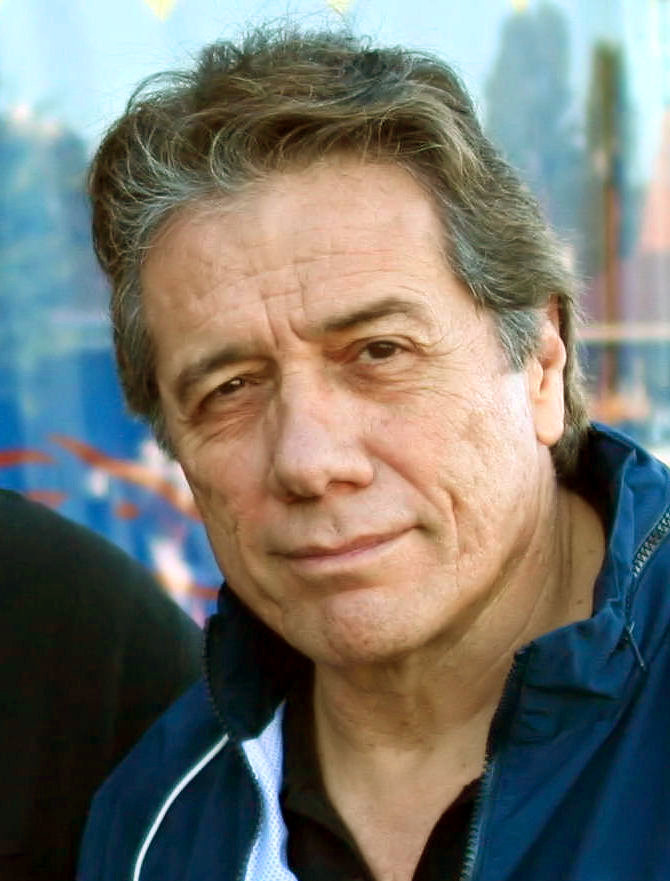
From 1984 to 1989, Olmos starred in one of his most defining roles as the taciturn and disciplined police Lieutenant Martin Castillo in the iconic television series Miami Vice, opposite Don Johnson and Philip Michael Thomas. His performance earned him a Golden Globe Award and an Emmy Award in 1985. He was also considered for the role of Captain Jean-Luc Picard on Star Trek: The Next Generation in 1986 but declined.
From 2003 to 2009, Olmos starred as Commander William Adama in the critically acclaimed reimagined Battlestar Galactica miniseries and subsequent television series. He was a central figure in the show, which explored complex themes of humanity, war, and survival. Olmos expressed great satisfaction with his work on the series, stating that it was "the best usage of television I've ever been a part of to date."
3.4.3. Other notable series
Olmos has had significant roles in various other television series. He had a recurring role as U.S. Supreme Court Justice Roberto Mendoza in the NBC drama The West Wing (1999-2000). From 2002 to 2004, he starred as Jess Gonzalez, a recently widowed father, in the PBS drama American Family: Journey of Dreams. In 2007, he guest-starred as Mr. Hector Vega in the series finale of the ABC sitcom George Lopez. He joined the cast of Dexter for its sixth season (2011), portraying Professor Gellar, a "brilliant, charismatic professor of religious studies." He also appeared in CSI: NY (2010), Eureka (2011), Portlandia (2012), Agents of S.H.I.E.L.D. (2015) as Robert Gonzales, Narcos (2017) as Chucho Peña, and a main role as Felipe Reyes in Mayans M.C. (2018-2023). In 2024, he appeared in Blue Bloods.
3.4.4. Television films and miniseries
Olmos has also starred in numerous television films and miniseries. These include Menendez: A Killing in Beverly Hills (1994) as Jose Menendez, The Burning Season (1994) as Wilson Pinheiro, The Limbic Region (1996) as Jon Lucca, Dead Man's Walk (1996) as Captain Salazar, and 12 Angry Men (1997) as Juror #11. He also appeared in The Wall (1998) and The Taking of Pelham One Two Three (1998), and Bonanno: A Godfather's Story (1999) as Salvatore Maranzano. In 2000, he was in The Princess & the Barrio Boy, and in 2001, The Judge.
4. Directing and production
Edward James Olmos has significantly contributed behind the camera as a director and producer, often focusing on projects that address social issues and promote Latino culture. In 1992, he directed and starred in American Me, a powerful and controversial film exploring the lives of Chicano gang members. In 2006, he co-produced, directed, and played the bit part of Julian Nava in the HBO film Walkout, which depicted the 1968 Chicano Blowouts. He also directed four episodes of Battlestar Galactica: "Tigh Me Up, Tigh Me Down" (Season 1), "Taking a Break from All Your Worries" (Season 3), "Escape Velocity" (Season 4), and "Islanded in a Stream of Stars" (Season 4). He further directed a television film based on the show, The Plan (2009). His other directing credits include Jack and Marilyn (2002), and he also served as a producer on films such as Filly Brown (2012), El Americano: The Movie (2016), Monday Nights at Seven (2016), The Devil Has a Name (2019), Walking with Herb (2019), Emu Plains (2019), and The Art of Living (2019).
5. Social and political activism
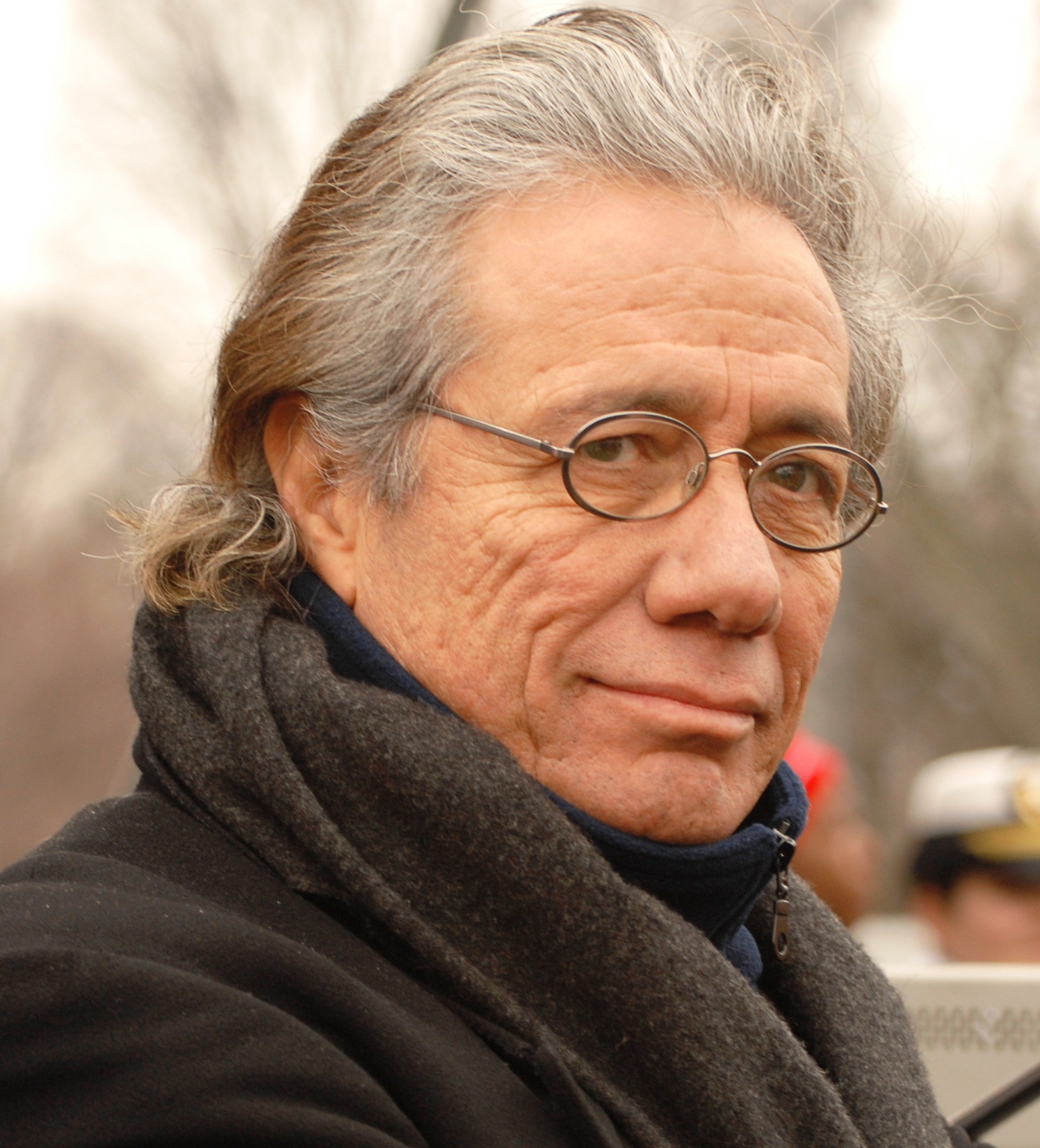
Edward James Olmos is renowned for his profound commitment to social justice, human rights, and community empowerment, particularly within the Latino community, and his broader advocacy work.
5.1. Advocacy for the Latino community
Olmos has been a vocal advocate for the U.S. Hispanic community. During the 1992 Los Angeles riot, he personally went out with a broom to help clean up and rebuild affected communities, famously stating he "just started sweeping." He also appeared on The Oprah Winfrey Show to discuss the riots. In 1997, he co-founded the Los Angeles Latino International Film Festival with Marlene Dermer, George Hernandez, and Kirk Whisler, dedicated to promoting Latino arts and culture. In the same year, he co-founded Latino Literacy Now with Kirk Whisler, a non-profit organization that has organized Latino Book & Family Festivals across the United States, attracting over 700,000 attendees.
In 1998, Olmos founded and became chairman of Latino Public Broadcasting, an organization that funds public television programming focusing on issues affecting Hispanics and advocates for diverse perspectives in public television. That same year, he starred in The Wonderful Ice Cream Suit. In 1999, Olmos was a driving force behind Americanos: Latino Life in the U.S., a book project featuring over 30 award-winning photographers, which later evolved into a Smithsonian traveling exhibition, a music CD, and an HBO special. He also frequently visits juvenile halls and detention centers to speak to at-risk teenagers, emphasizing the importance of education, the risks of gang involvement, and personal responsibility.
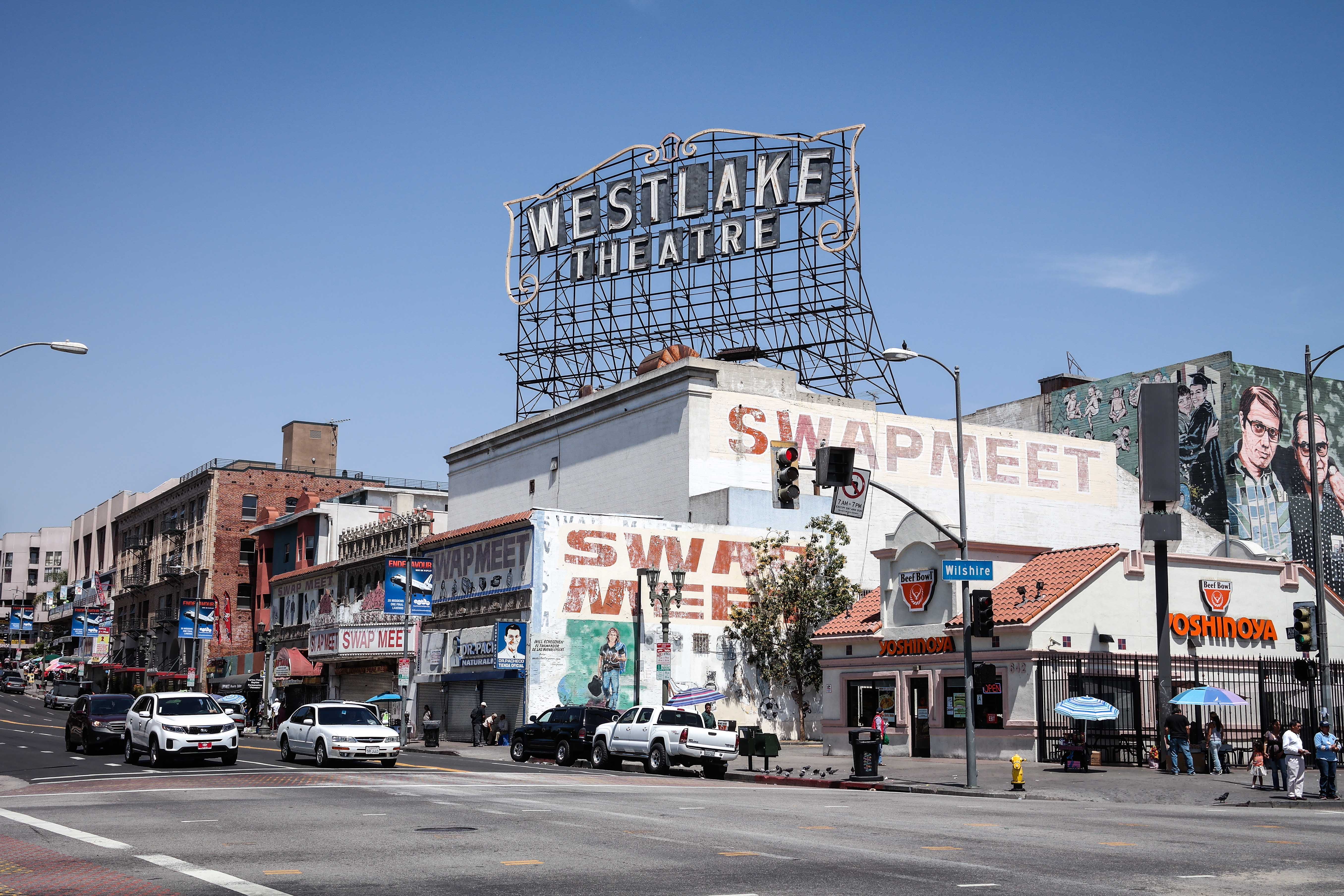
5.3. Animal rights and environmentalism
Olmos has vocally supported various animal rights causes. In 2015, he contributed his voice to the documentary film Unity (film), which advocates for a transformation in humanity's treatment of animals and the natural world. Since 2015, Olmos has maintained a vegan lifestyle. He has collaborated with PETA on several campaigns, including radio and television advertisements urging pet owners to keep their animals indoors during fireworks displays, and voicing the Coyote character in their "Council of Animals" sculpture. In September 2023, PETA recognized his efforts by presenting him with a Humanitarian Award. He is also a supporter of the SENS Research Foundation, a non-profit organization dedicated to treating and curing diseases of aging by repairing underlying cellular damage, and has narrated a series of animations explaining the concept of SENS.
6. Personal life
Edward James Olmos's personal life includes his family, relationships, and a recent significant health experience.
6.1. Marriages and relationships
From 1979 to 1987, Olmos resided in West New York, New Jersey. In 1971, he married Kaija Keel, the daughter of actor Howard Keel. They had two children, Bodie and Mico, before their divorce in 1992. Olmos also has four adopted children: Daniela, Michael, Brandon, and Tamiko. He married actress Lorraine Bracco in 1994, but she filed for divorce in January 2002 after five years of separation. Olmos had a long-term relationship with actress Lymari Nadal, whom he married in 2002. They separated in 2013. In 1993, he was awarded an honorary Doctor of Humane Letters (L.H.D.) degree from Whittier College, followed by an honorary Doctorate of Fine Arts from California State University, Fresno, in 1996. In 2007, after a seven-year process, he obtained Mexican nationality. The asteroid 5608 Olmos is named in his honor.
6.2. Health
In 2022, Edward James Olmos was diagnosed with throat cancer. He immediately underwent chemotherapy for treatment. By the end of that year, the cancer went into remission. His diagnosis and successful recovery were not publicly announced until May 2023.
7. Controversies
In 1992, a teenage girl accused Olmos of twice touching her in a sexual manner while they were watching television and flirting. Olmos paid the family a cash settlement of 150.00 K USD in response to the allegations, but he denied their truthfulness, claiming the settlement was intended to protect his son, Bodie Olmos, rather than himself. In 1997, another woman accused Olmos of sexually assaulting her in a South Carolina hotel room.
8. Awards and nominations
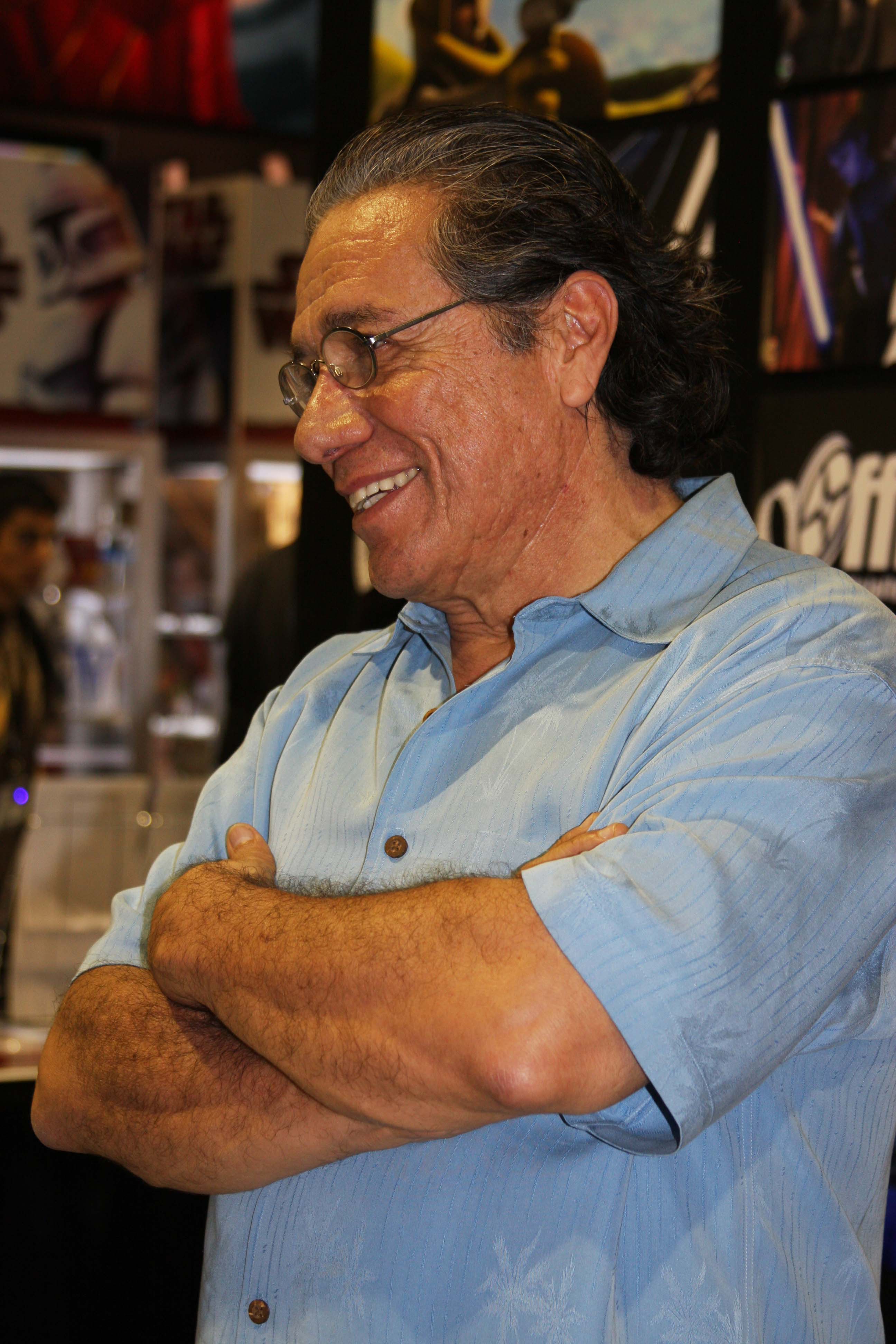
| Year | Nominated work | Award | Results |
|---|---|---|---|
| 1985 | Miami Vice | Golden Globe Award for Best Supporting Actor - Series, Miniseries or Television Film | Won |
| 1985 | Primetime Emmy Award for Outstanding Supporting Actor in a Drama Series | Won | |
| 1986 | Nominated | ||
| 1988 | Stand and Deliver | Independent Spirit Award for Best Male Lead | Won |
| 1988 | Academy Award for Best Actor | Nominated | |
| 1988 | Golden Globe Award for Best Actor - Motion Picture Drama | Nominated | |
| 1994 | The Burning Season | Golden Globe Award for Best Supporting Actor - Series, Miniseries or Television Film | Nominated |
| 1994 | Primetime Emmy Award for Outstanding Supporting Actor in a Miniseries or a Movie | Nominated | |
| 1997 | Selena | ALMA Award for Outstanding Actor in a Feature Film | Won |
| 1997 | Hollywood Confidential | ALMA Award for Outstanding Actor in a Miniseries or Television Film | Won |
| 2001 | The Judge | Nominated | |
| 2003 | Battlactica | ALMA Award for Outstanding Actor in a Drama Series | Won |
| 2005 | ALMA Award for Outstanding Actor in a Series, Miniseries or Television Film | Won | |
| 2006 | ALMA Award for Outstanding Actor - Television Series, Mini-Series, or TV Movie | Won (tied with Michael Peña) | |
| 2007 | Saturn Award for Best Actor on Television | Nominated | |
| 2008 | Nominated | ||
| 2009 | ALMA Award for Best Actor on Television | Won | |
| 2011 | Dexter | Screen Actors Guild Award for Outstanding Performance by an Ensemble in a Drama Series | Nominated |
| 2011 | Saturn Award for Best Guest Starring Role on Television | Nominated | |
| 2016 | Himself | Mary Pickford Award | Won |
9. Legacy and impact
Edward James Olmos's legacy extends far beyond his acting roles, marking him as a pioneering artist and a dedicated advocate for social change. He has consistently championed more diversified roles and images of Latinos in American media, using his platform to challenge stereotypes and promote authentic representation. His work, both on and off screen, has inspired countless individuals and contributed significantly to the cultural landscape. Through his performances, directing, and tireless activism, Olmos has underscored the importance of education, cultural understanding, and human dignity, leaving an indelible mark on Hollywood and the communities he serves.